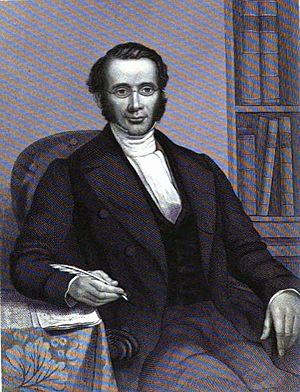Benjamin Parsons facts for kids
Benjamin Parsons (1797–1855) was an English minister who belonged to a church group called the Congregationalists. He was well-known for being a strong voice in politics and for encouraging the people in his church to get involved in important causes.
Contents
Early Life and Ministry
Benjamin Parsons was born on February 16, 1797, in a place called Nibley in Gloucestershire, England. His parents, Thomas and Anna, came from farming families. He went to school in Dursley and Wotton-under-Edge. After school, he trained for seven years to become a tailor in Frampton-on-Severn.
In 1815, Benjamin started teaching at a Sunday-school in Frampton. He joined a church in the Countess of Huntingdon's Connexion at Rodborough Tabernacle in 1821. Later that year, he began studying at Cheshunt College. After working as a minister in Swansea and Rochdale, he officially became a minister for the church at Ebley, near Stroud in Gloucestershire, in August 1826.
A Champion for Education
A church building had been set up in Ebley in 1797, but there was no school. Benjamin Parsons worked hard to change this. He gave talks to men in the evenings and started a night-school in a smaller church at Paken Hill. In 1832, he also created a special fund to help people save money.
A full day-school was finally opened in 1840. To support his own family, Benjamin also ran a school from his home. He believed strongly that everyone, including girls, should have the chance to learn.
Benjamin Parsons gave his last sermon at Ebley on October 24, 1854, because he was not well. He passed away on January 10, 1855, and was buried in Ebley.
His Important Beliefs
Benjamin Parsons was a passionate activist who cared deeply about several big issues of his time.
Fighting for Freedom
He was an abolitionist, which means he wanted to end slavery. He supported this cause even before the Slavery Abolition Act 1833 made slavery illegal in most British lands.
Supporting Workers' Rights
He also supported the "six points" of Chartism. This was a movement where working-class people demanded more rights, like the right to vote for all men.
Against Unfair Laws
Benjamin Parsons spoke out against the Corn Laws. These laws made food, especially bread, very expensive for ordinary people. He brought up a motion against them at a big meeting in 1841.
Other Key Causes
His three main causes were:
- Education: He believed schools should be run by local communities and volunteers, not by the government.
- Temperance: He was part of the temperance movement, which encouraged people to drink less alcohol or no alcohol at all.
- Sabbath Observance: He believed Sunday should be a day of rest and worship.
His Writings
Benjamin Parsons used humor and sharp comments in his writing. He often wrote about the interests of working-class people, especially about the importance of education. He was known for coming up with clever and clear arguments.
Some of his notable works include:
- Anti-Bacchus (1840): This book was about the temperance movement.
- The Mental and Moral Dignity of Women (1842): In this book, he argued that girls and women should have the same educational opportunities as boys and men.
- Education, the Birthright of every Human Being (1845): This work highlighted his strong belief that everyone deserves an education.
- Tracts for Fustian Jackets and Smock Frocks (1847-1849): These were small, affordable booklets aimed at working-class readers.
- The Greatness of the British Empire (1851): These were lectures he gave about English history.
He also worked as an editor for a magazine called The Working Man's Friend and Family Instructor in the 1850s.
His Family
On November 3, 1830, Benjamin Parsons married Amelia Fry. They had several children. One of their daughters, Anna Shatford Lloyd, became a school principal. Anna's daughter, Martha Lloyd, later took over the school from her mother. Benjamin was a strong supporter of education for women, and his own daughter was taught at the school he ran from his home.
 | Selma Burke |
 | Pauline Powell Burns |
 | Frederick J. Brown |
 | Robert Blackburn |


